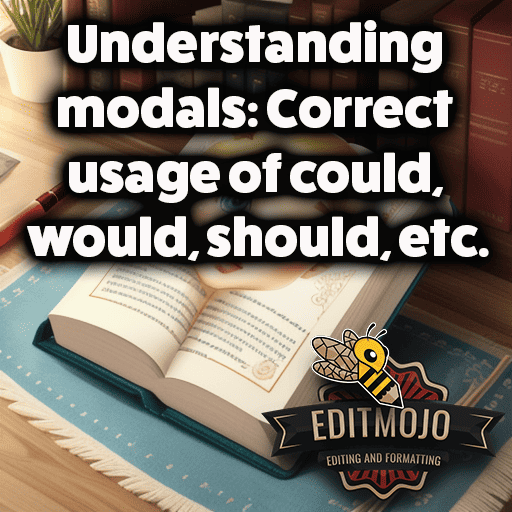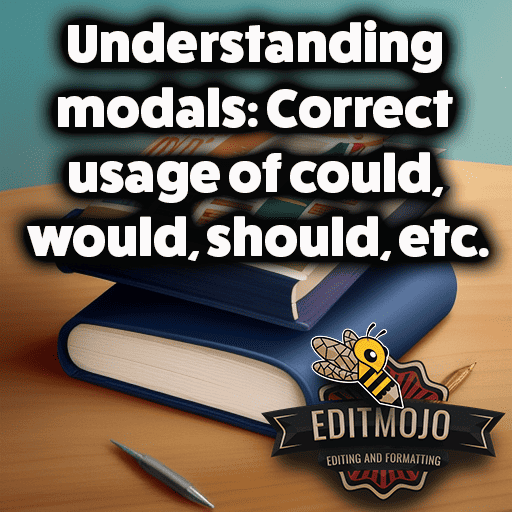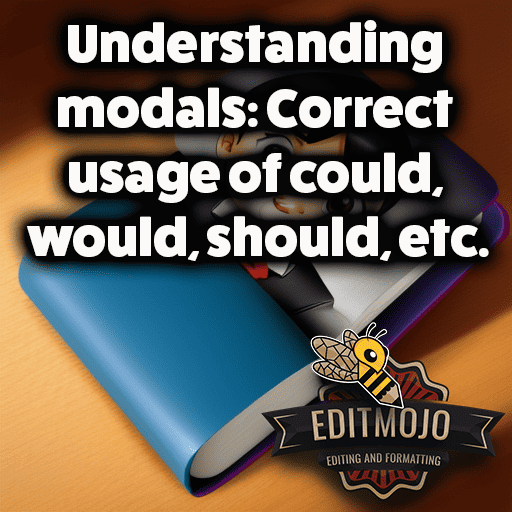Understanding Modals: Correct Usage of Could, Would, Should, and More
Understanding modals: Correct usage of could, would, should, etc. Navigating the English language can sometimes feel like trying to solve an intricate puzzle. However, learning to use modals correctly can be a significant piece in completing that puzzle.
English is replete with fascinating elements that make it rich, versatile, and sometimes a little tricky. One such intriguing component is modals. Modals are special verbs that add different shades of meanings to our sentences. This blog post will shine a spotlight on these vital linguistic tools and elucidate their correct usage. So buckle up, and let’s dive into the world of models!
Key Takeaways Table (writing resources)
| Modal | Uses | Common Mistakes |
|---|---|---|
| Could | Past abilities, possibilities, polite requests, permissions | Incorrectly used to indicate current ability |
| Would | Polite requests, hypothetical situations, past habits | Incorrectly used for certain future events |
| Should | Advice, recommendations, moral obligations | Incorrectly used when giving instructions |
| May/Might | Possibilities, permissions | ‘Might’ incorrectly used for highly probable events |
| Must | Obligations, necessities, strong belief | Incorrectly used for past obligations |
| Can/Will | Abilities, permissions, future certainty, willingness | ‘Can’ incorrectly used for future possibilities |
II. Understanding Modals
A. What are Modals?
In essence, modals are helper verbs that express necessities, possibilities, abilities, and permissions. They work alongside the main verb to create more nuanced meanings. However, they never change their form regardless of the subject. For instance, it’s always ‘could’, whether we’re talking about I, you, he, she, or they.

B. The Power of Modals
Modals have the unique power to transform a plain sentence into one filled with subtlety, politeness, or even uncertainty. Take, for example, the statement: “You go to the store.” Adding the modal ‘can’ changes the imperative tone to a polite request: “Can you go to the store?”
C. Categories of Modals
Modals fall into two primary categories: Primary Modals and Semi-modals. Primary modals include ‘can’, ‘could’, ‘may’, ‘might’, ‘shall’, ‘should’, ‘will’, ‘would’, and ‘must’. Semi-modals, such as ‘have to’, ‘need to’, and ‘ought to’, behave somewhat like modals but have a few differences.
D. The Rulebook for Modals
While modals are powerful, they follow specific rules. The most crucial one is that they always come before the base form of a verb and can’t be used with ‘to’ (except in the case of ‘ought to’). For example, we say, “She could dance,” not “She could to dance.”
III. Deep Dive into Individual Modals
Here, we’ll dissect each modal, discuss its various uses, provide examples, and address common errors.

A. ‘Could’
‘Could’ is the past tense of ‘can’, but it’s not just used for past actions. It can also express possibilities, make requests, or give or ask for permission.
For example:
- Past ability: “When I was young, I could run fast.”
- Possibility: “It could rain later.”
- Request: “Could you help me, please?”
- Permission: “You could take the day off if you need to.”
Common mistake: Don’t use ‘could’ to talk about something someone is capable of doing now. For instance, it’s incorrect to say, “She could speak three languages” when she’s still able to do it. Instead, use ‘can’.
B. ‘Would’
‘Would’ is a modal of politeness, hypothetical situations, and past habits.
For instance:
- Polite request: “Would you mind opening the window?”
- Hypothetical situation: “If I were a millionaire, I would travel the world.”
- Past habit: “When I was a kid, I would go fishing every summer.”
Common mistake: Avoid using ‘would’ for future events that are certain. Instead, use ‘will’. For instance, it’s incorrect to say
, “She would be here tomorrow,” if you know she’s definitely coming.
C. ‘Should’
‘Should’ expresses advice, recommendations, or moral obligations.
Examples:
- Advice: “You should quit smoking.”
- Recommendation: “You should see that movie. It’s fantastic.”
- Obligation: “We should help those less fortunate than ourselves.”
Common mistake: Don’t use ‘should’ when giving instructions. Instead, use ‘must’ or ‘have to’. For instance, it’s incorrect to say, “You should click on this button to save the file” when giving specific instructions.
D. ‘May’ and ‘Might’
‘May’ and ‘might’ express possibility or permission.
Examples:
- Possibility (May): “It may rain later.”
- Possibility (Might): “If we leave now, we might catch the bus.”
- Permission (May): “May I use your phone?”
Common mistake: ‘Might’ is often seen as less likely than ‘may’. It’s inappropriate to use ‘might’ for something highly probable. For instance, “It might be the sunniest day of the year tomorrow” is less likely than “It may be the sunniest day of the year tomorrow.”
E. ‘Must’
‘Must’ indicates obligation, necessity, or strong belief.
Examples:
- Obligation: “You must arrive on time.”
- Necessity: “We must buy more milk.”
- Strong belief: “She must be tired after such a long trip.”
Common mistake: Don’t use ‘must’ for past obligations. Instead, use ‘had to’. For instance, it’s incorrect to say, “I must go to the doctor yesterday.” The correct sentence is, “I had to go to the doctor yesterday.”

F. ‘Can’ and ‘Will’
‘Can’ expresses ability or permission, while ‘will’ is used for future certainty or willingness.
Examples:
- Ability (Can): “I can play the guitar.”
- Permission (Can): “Can I borrow your book?”
- Future (Will): “I will visit my grandparents tomorrow.”
- Willingness (Will): “I will help you with your homework.”
Common mistake: Don’t use ‘can’ to talk about future possibilities. Instead, use ‘could’ or ‘may’. For instance, it’s incorrect to say, “It can rain tomorrow.” Instead, say, “It could rain tomorrow” or “It may rain tomorrow.”
IV. Modals in Questions and Negative Sentences
Modals can also be used in questions and negative sentences. In questions, the modal comes before the subject: “Could you pass the salt?” In negative sentences, ‘not’ is added after the modal: “He should not be late.”
V. Advanced Concepts
A. Double Modals
Certain dialects of English, especially in Southern United States, use double modals like “might could”, “used to could”, etc. While not standard, understanding these forms can be useful for comprehending regional language nuances.
B. Modals of Deduction and Speculation
Modals like ‘must’, ‘might’, ‘could’, and ‘can’t’ are often used to deduce or speculate: “She must be happy”, “They might be home”.
C. Modals in Passive Voice
Modals are used in passive sentences too: “The bill should be paid”, “The letter must be written”.
D. Modals in Conditional Sentences
In conditional sentences, ‘would’, ‘could’, and ‘might’ are often used: “If I
had time, I would read more”, “If I were taller, I could reach the top shelf”.
VI. Tips and Tricks to Remember Modals
Remembering all the nuances of modals can be challenging. But don’t worry, mnemonic devices, and understanding common patterns can help.
VII. Interactive Section
Check out this Quiz to test your understanding of modals!
VIII. Conclusion
Understanding and using modals correctly can make a world of difference in your English communication. So keep practicing and learning. Remember, language mastery is a journey, not a destination.
IX. Resources and Further Reading
Here are some resources for you to explore:
Good luck on your linguistic adventure!
Top Five Questions and Answers:
- Q: What are modals in English grammar? A: Modals are special helper verbs that express necessities, possibilities, abilities, and permissions. They work with the main verb to create nuanced meanings.
- Q: How do modals function in a sentence? A: Modals always come before the base form of a verb and modify its meaning. They add context of necessity, possibility, capability, or permission. For example, “I can swim” uses the modal ‘can’ to indicate ability.
- Q: What’s the difference between ‘may’ and ‘might’? A: Both ‘may’ and ‘might’ express possibility, but ‘might’ is often used when the possibility is less certain than ‘may’.
- Q: When should I use ‘could’, ‘would’, and ‘should’? A: ‘Could’ is used for past abilities, possibilities, polite requests, and permissions. ‘Would’ is used for polite requests, hypothetical situations, and past habits. ‘Should’ is used to express advice, recommendations, or moral obligations.
- Q: What are common mistakes when using modals? A: Common mistakes include using the wrong modal for the context (for instance, using ‘could’ to indicate a current ability) or using a modal where it’s not needed (for example, using ‘should’ when giving instructions).
